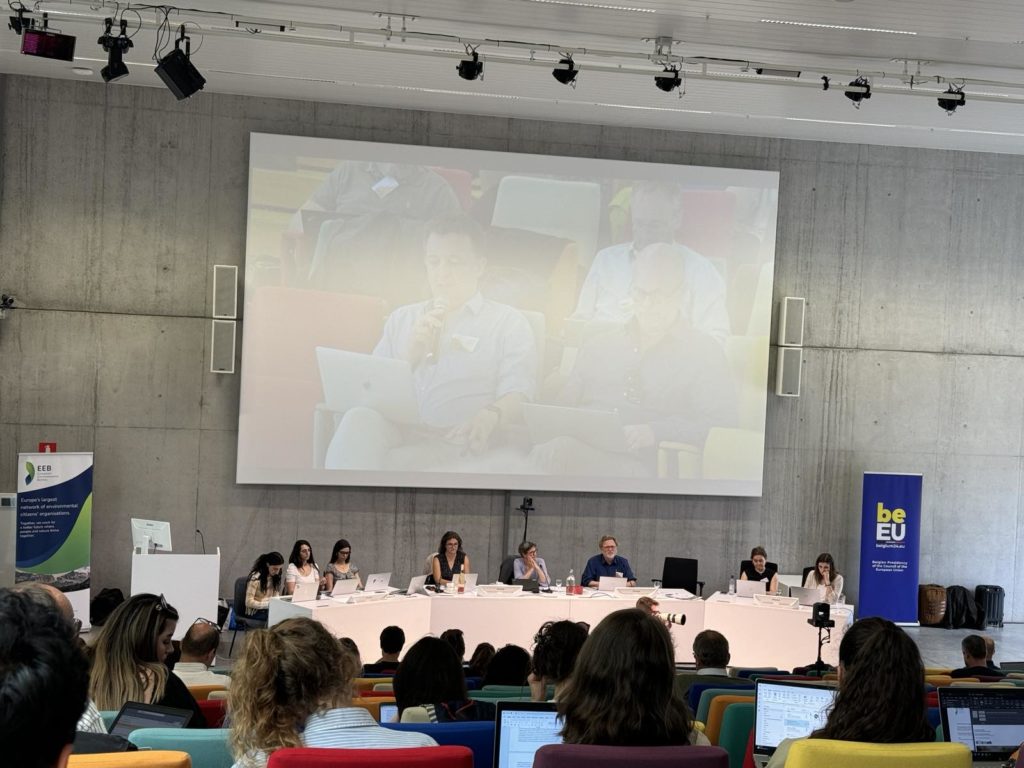On 13 May 2024, EEB celebrated its 50th Anniversary and conducted the Annual Conference devoted to overview of EEB’s long way and plans for the future.
Since next European Parliamentary elections will be conducted in early June 2024, it is vitally important to have a strong vision for environmental policy and legislation priorities to guide the next 5-year legislative cycle. That is why it is so important to have the European Pact for the Future, a vision for environmental transformation in 2024-2030.
Over 50 years of its work, EEB performed marvelous things and has fantastic achievements but still a lot needs to be done and this is evidenced by environmental crisis faced by many European countries.
Leena Ylä-Mononen , Executive director of EEA European Environment Agency, stated that based on science data, 2024 is another year of extreme weather and increasing climate risks. Systemic climate, biodiversity and pollution crisis shows that we are a long way from reaching 2030 targets for zero pollution, production and consumption pollution and other targets of the European Green Deal. The recent EEA’s progress report on implementation of the 8th Environment Action Programme (8th EAP) objectives on the basis of a set of 28 headline indicators and corresponding targets shows that the overall picture is not optimistic.
The EUCRA (European Climate Risk Assessment) report presents major climate risks for Europe in five clusters: Ecosystems, Food, Health, Infrastructure, Economy and Finance. It makes obvious that urgent action is needed, more action is needed, further investigation is needed. We need to increase ambition in implementation of the European Green Deal targets. The European Green Deal is becoming more important than ever, particularly in the context of 2024 European parliament elections.
We should speak about threats to marine ecosystems, about climate related costs to economy. Resilience, fairness, sustainability should become increasingly important
In her video message Steffi Lemke, German Federal Minister for the Environment stated that when EEB was established in the 1970s, the environment was in a very bad shape. Since then environmental policy has developed substantially but not enough. Therefore, our commitment is indispensable. Environment and nature are under pressure and need our protection more than ever.
Video message from Austrian Minister for Environment Leonore Gewessler focused on doubling our commitment to environmental priorities . EU managed to show its unity and effective action to oppose Russian invasion. We should be united in the same way in issues of green transition. Green energy transition without fossil fuels is crucial and Europe has technology for this. Important legislation has been adopted but more is on its way. Environmental justice is important. We must send a clear sign in 2024 elections that we will pursue the green path. Decreased emissions and better environmental conditions will create new decent jobs, improved health of citizens.
Krzysztof Bolesta, Deputy Polish Minister of Climate and Environment, spoke about ways of ensuring strong sustainable industrial policy.
Florika Fink-Hooijer Director General, DG Environment focused on circularity, zero pollution, and biodiversity and the need to radically reduce resource wasting. She gave an overview of the progress made on the ways towards circularity, mentioned successes in recycling infrastructure development but also spoke about challenges such as plastic recycling. In terms of biodiversity preservation, the regulation on forests decreased deforestation substantially but more is to be done on soil monitoring, pollinator strategy development etc. One window of opportunity right after the elections to get legislation approved on renewables. It will make a good effect on climate mitigation. We need to go quickly from fossil fuels but it should be also understood that the effect will not be immediate.
The motto of the meeting was that we should go from fear to hope. We have to demonstrate we have solutions. Circularity is one of the solutions.
Patrick ten Brink, EEB Secretary General stated that EEB developed the Pact that will address the fears but will give hope. EEB explored what civil society wants, conducted consultations with stakeholders and developed the Pact for next 5 years. Parliamentary elections in June are very important for setting environmental agenda for one planet economy and the conference is another opportunity to express opinions on this. We need to strengthen regulations, it is not time for deregulation. We only use 11 % of resources in circular economy while 89 % are lost and this drastic situation has to be changed.
Pegah Moulana, Secretary General Youth and Environment Europe and EEB Board member expressed her worries about the future. Results of the youth survey are as follows: 85% say we failed to care about the planet, 84 % are worried about climate crisis.
An important topic discussed at the conference was promotion of a just transition, development of a new social contract to leave no-one behind.
Pollution, environmental degradation and poverty are interrelated issues and a big question is how the European Green Deal addresses them. Real examples were discussed when in cases of environmentally hazardous situation better-off people could leave contaminated territories but those without financial means had to stay and suffer from adverse consequences. One of the examples was the case of a 10-year old girl living in London who suffered from asthma. She was in hospital and then returned home in very poor and polluted area in London and died. It is important to ensure incentives and subsidies for people who cannot afford better technologies (better safer car, air conditioning etc). When you go to cheap stores of toys and clothes, you will find products that do not comply with environmental quality standards and exposure to environmental hazards as a result of poverty is an important social issue.
Participants of the conference discussed hazards related to chemicals. Also, mercury pollution and pesticides are a problem and EEB works a lot on these issues.
Water issues are also crucial for social well-being and it looks like there is a need for A Blue Deal. More holistic, integrated priority for water is needed. Not only ecosystems, but also health and economy are to be considered. We want more dialogue among stakeholders to protect soils, to protect biodiversity. We want the EU to be more consequent in implementing all the policies we decide to have and we have to protect our social and environmental standards.
Floods in Slovakia caused 10% GDP damage, which is beyond comprehension and is a bright evidence how environment and economy are interrelated.
Through the prism of resilience, we need to make sure that soils are protected and support from parliament is crucial. The policy approach is very important and in order to get good results, we have to make sure that we are coherent in policy approach.
Participants emphasized that resource efficiency and circular economy are crucial and we have to act fast to promote key solutions. It took 30 years to speak about phasing out fossil fuels in order to slow down climate change. We cannot afford to spend another 30 years to start talking about resource efficiency and circular economy. We have sufficient research studies to show that nature-oriented approaches benefit economy.
Reuse, reduce recycle – are important priorities and we have to make them loud. There should be clever incentives, for food producers to have for example exchange of containers. Other practical initiatives aimed to promote reuse and reduction of waste were exemplified.
An important discussion focused on climate, environmental and social justice and ways of just transition.
Speaking about future parliamentary elections, the participants often emphasized the risk that next political mandate will lack the ambition for strong environmental policy and that we will not close the gap that EU Green Deal left unimplemented.
Another aspect that was raised was public participation in environmental decision-making and making sure that people have a say in this area. This is a key issue of environmental democracy and should be encouraged as much as possible.
Coming back to EEB’s 50th anniversary, it was stated that EEB, WWF and other NGOs worked with the EU Commission and created many pieces of legislation. We set the standards the auto motor emissions, air quality, chemicals, industrial manufacturing – and it is very inspiring to speak about what we did. But we did not confront climate change and inequality. We have to think more strategically as we do not have anther 50 years. Europe was an environmental leader but this is changing, particularly because in view of the parliamentary elections we face the risk of move towards radical right. The rate of mental illnesses, suicides went up because this is a generation that is anxious about their future in terms of climate and economy.
Defending defenders is another vital direction of environmental protection as environmentalists and journalists are being prosecuted in many countries. Access to justice in environmental matters was discussed and initiation of litigation cases was mentioned as one of the important tools of environmental protection. Legal responsibility for ecocide is another way to explore.
It was stated how important it is to compare the economy of well-being vs economy of extraction and importantly, it was emphasized that all of us have to act. We cannot do business as usual. We need to be so much more strategic and collaborative.
The conference could have mentioned the potential of the European Green Deal as a tool of ensuring European environmental standards and thus as a tool of strengthening security of the EU and ensuring protection against outside influence. Outrageous processes taking place in Europe, first of all the war in Ukraine, require a fast and efficient step.
EPL congratulates EEB on the 50th Anniversary and wishes further success on its path of creating the world worth living in by implementing the European Pact for the Future that fosters hope and courage, opens opportunities, creates wellbeing for all, catalyses competitiveness through sustainability and drives the needed transformative system change for a sustainable future.



